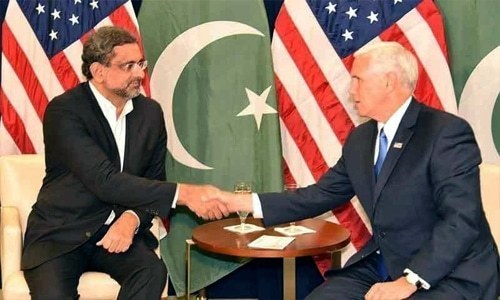
WASHINGTON: The United States has reminded Pakistan that it’s still on notice to eliminate all terrorist sanctuaries from its territory, although relations between the two countries show some signs of improvement.
The reminder — conveyed by US Principal Deputy Assistant Secretary of State for South and Central Asian Affairs Alice G. Wells at a congressional hearing on Wednesday — re-emphasises the point that Washington never fails to mention the need for Pakistan to eliminate terrorism.
Take a look: In tit-for-tat move, Pakistan imposes travel restrictions on US diplomats
“Pakistan is on notice that we expect its unequivocal cooperation ending sanctuaries that the Taliban have enjoyed since the remnants of their toppled regime fled into Pakistan in 2001,” said Ms Wells while reviewing one year of the Trump administration’s South Asia Strategy.
Islamabad has rejected such American allegations and urged Washington not to blame it for failures
In a New Year Day message this year, President Donald Trump too had put Pakistan on notice, accusing it of “taking billions and billions of dollars” from the United States while “housing the same terrorists” that it was supposed to fight. And a few days after the speech, Washington suspended more than two billion dollars of security aid to Pakistan.
Pakistan has rejected these allegations as unfounded and has urged Washington not to blame Islamabad for its failures in Afghanistan.
In her testimony before the House Foreign Affairs Committee on “US policy toward Afghanistan”, Ms Wells acknowledged that the policy of coercing Pakistan into accepting US demands had not been very successful.
“Despite some positive indicators, we have not yet seen Pakistan take the sustained or decisive steps that we would have expected to see ten months after the announcement of the (Trump administration’s) South Asia strategy,” she said.
The senior US official acknowledged that Pakistan “has an important role to play and has legitimate interests” in Afghanistan, which “it wants to ensure are met during any peace process”.
The United States, she said, was not only aware of Pakistan’s interests but was also willing to work with Islamabad to allay its concerns.
“The dialogue that we have with Pakistan seeks to address those concerns while also encouraging additional concrete support for Afghan peace efforts,” she said.
Her statement indicates that the Trump administration has reached the same conclusion that their predecessors had after years of engagement in Afghanistan — it’s an unwinnable war.
“Of course, the Taliban remain a resilient foe. Afghan forces are still labouring to regain control of large areas of rural Afghanistan,” Ms Wells said.
“Equally – if not more troubling – IS Khorasan has increased the pace and scope of its attacks against urban targets, often with a devastating civilian toll”.
The US official noted that the attacks had increasingly focused on ethnic and religious minorities, and were clearly aimed at stoking sectarian and political tensions to undermine popular support for a peace process.
Ms Wells identified four key areas where the US was working to help bolster prospects for an eventual settlement: Supporting Afghan efforts to reduce violence and protect a peace process from spoilers, encouraging all political actors — including the Taliban — to participate in the peace process, supporting Kabul’s efforts to eliminate the conditions that cause militancy and encouraging Afghanistan’s close and distant neighbours to back the peace process.
For Pakistan, she had a clearer message: work with the US to bring the Taliban to the negotiating table and arrest or expel those Taliban elements that do not join the peace process.
“More broadly, all of Afghanistan’s neighbours — from Iran and Russia, to India, China, and the Central Asian states — have repeatedly stated their support for an Afghan peace process,” said Ms Well, counting this among the indicators of success of the Trump administration’s Afghan policy.
Unfortunately, in the past such indicators did not lead to real peace in Afghanistan, which has been in a state of war for more than three decades now.
Published in Dawn, June 22nd, 2018














































